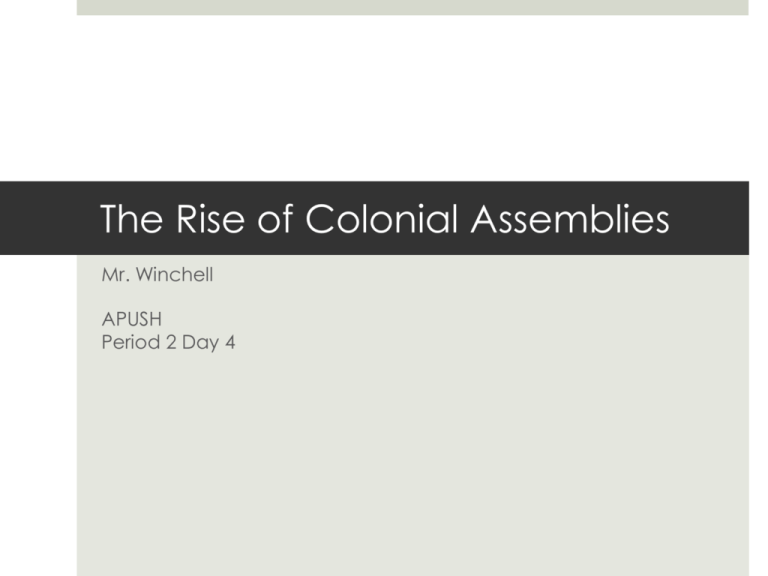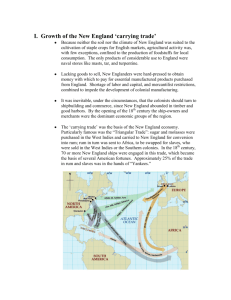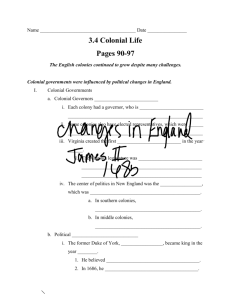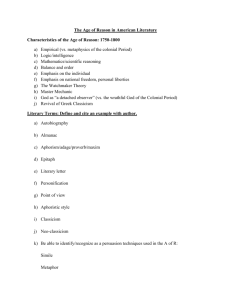The Rise of Colonial Assemblies
advertisement

The Rise of Colonial Assemblies Mr. Winchell APUSH Period 2 Day 4 Do Now Presented by: What was the South Atlantic System and how did it impact economic development in the Northern Colonies? What was salutary neglect and how did it impact colonial society? Questions to Consider… IDENTITY: To what extend did British American colonists develop a sense of identity separate from that of English men and women? IDENTITY: What factors encouraged and what factors impeded the development of an ‘American’ identity? POLITICS AND POWER: In what ways did British American colonists model their political institutions on England? How did these colonists adapt these institutions in a way that seemed uniquely ‘American’? AP Concepts SOUTH ATLANTIC SYSTEM New England Farmers: Bread, Lumber, Fish, Meat, Wheat, Corn to the West Indies. 1750’s: 2/3 of New England’s Exports and ½ of Middle Colonies Exports went to the West Indies. Sugar from the Indies to England. Slaves to the West Indies. Manufactured Goods, textiles, iron goods to the US. Urban Economy 1. Upper classes Upper classes – Wealthy merchants dominated American cities; imitated British upper classes through architecture, consumption, and genteel culture. 2. Middle ranks Middle ranks – Artisans and shopkeepers made up nearly half the population. Innkeepers, butchers, seamstresses, shoemakers, weavers, bakers, carpenters, masons and other skilled workers lived in modest comfort, but most artisans were not well-to-do. 3. Lower classes Lower classes – Laboring men and women made up 30 percent of urban population; they were dockworkers and unskilled wageworkers, washerwomen, wool-spinners, servants, or prostitutes. The New Politics of Empire, 1713–1750 A. The Rise of Colonial Assemblies – Post-Glorious Revolution, assemblies in the colonies sought to limit the power of the crown; colonial elite led assemblies; men of wealth could be elected, but all men who owned property could vote. MA, NC, NJ, PA: Assembly ignored king’s requirement to pay the royal governor. Took control of taxation Assemblies were ruled by the colonial elite, but common people had input. Salutary Neglect Bureaucrats in England relaxed control over colonies when they were happy with the relationship (pleased by financial benefits); colonists took advantage of this relationship by increasing the power of their representative assemblies. Sir Robert Walpole (Leader of the House of Commons post Glorious Revolution) practice a policy of patronage. Patronage: giving offices and salaries to political friends. Walpole: “Let sleeping dogs lie.” These policies accidentally created a developing American identity. Mercantilism and the American Colonies Britain allowed Americans to own ships and transport goods Colonists made significant gains in control of exports during 18th century Increased trade relationship with the French sugar islands. Lack of currency in colonies further complicated financial relationships In 1751, Parliament passed the Currency Act, which barred New Englanders from establishing new banks and prohibited the use of publicly issued paper money to pay for private debts The English attempted to regain control of colonial economic pursuits. In the late 1740s, British officials vowed to reassert their power in America—an initiative that proved to have disastrous results.







